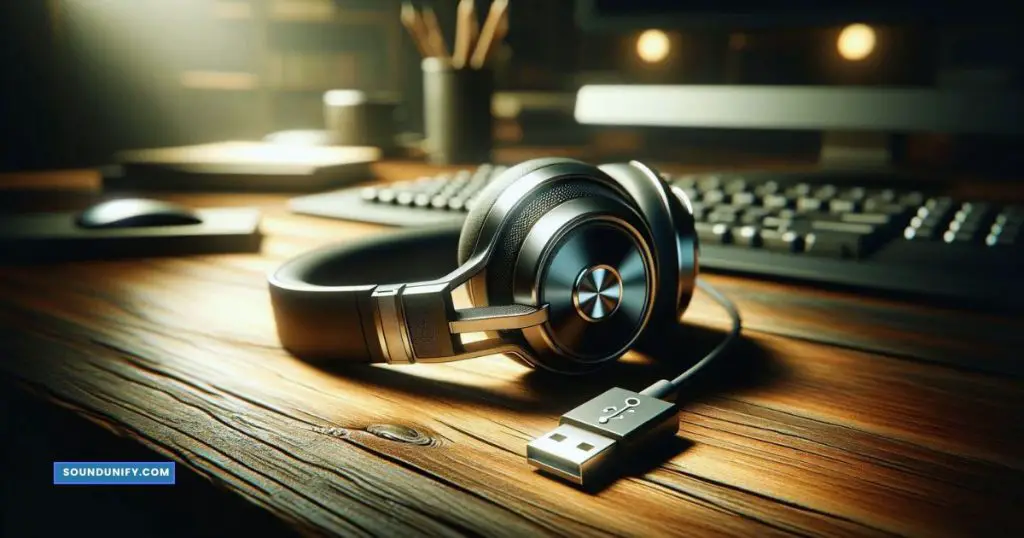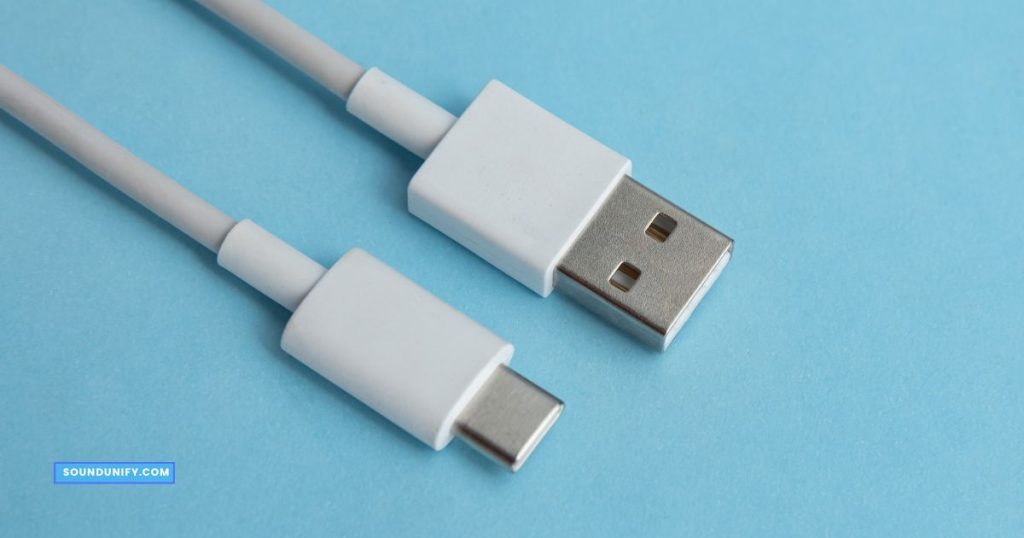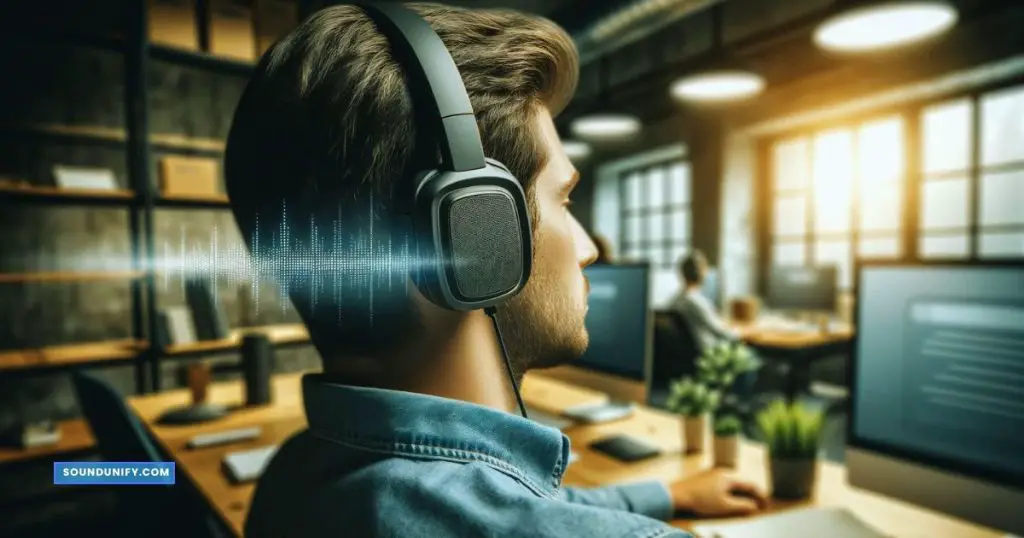USB headsets outshine traditional audio devices in every way. They offer superior sound quality, convenience, and versatility.
As a tech enthusiast, I’ve seen the evolution of audio devices, and I can confidently say that USB headsets are a game-changer.
Remember the days of struggling with poor audio quality during important online meetings or gaming sessions? Or the frustration of incompatible headphone jacks?
Those days are behind us, thanks to USB headsets. They’ve solved these common problems, making our digital lives smoother and more enjoyable.
In this blog post, I’ll dive into why USB headsets are better, sharing my experiences and insights.
So, if you’re still on the fence about making the switch, stick around. You might find the push you need right here.
Why USB Headsets Are Better?
USB headsets have several advantages, making them a superior choice for many users. Here are some key reasons why they are better:
1. Superior Audio Quality

One of the most significant advantages of USB headsets is their superior audio quality. Unlike traditional headsets that use analog signals, USB headsets convert these signals into digital format. This conversion produces a more precise, sharper, and detailed audio output.
Whether listening to music, participating in an online meeting, or being immersed in a gaming session, the enhanced audio quality can significantly improve your overall experience.
- Digital Signal: The digital signal used by USB headsets reduces the risk of sound degradation, which can occur with analog signals. This ensures that the sound you hear is as close as possible to the original audio.
- Noise Cancellation: Many USB headsets come with built-in noise cancellation features. This can significantly reduce background noise, allowing you to focus on your audio without distractions.
2. More Stable Connection

USB headsets provide a direct, wired connection to your device, which results in a more stable and reliable audio experience. This is especially beneficial when a stable connection is crucial, such as during an online meeting or a gaming session.
- Direct Connection: The direct connection via the USB port reduces the risk of connection loss or interference, a common issue with wireless or 3.5mm jack headsets.
- No Signal Loss: Unlike wireless headsets, which can suffer a signal loss due to distance or obstacles, USB headsets ensure a consistent signal quality regardless of your environment.
3. Easier to Use
USB headsets are known for their ease of use. Most models feature a plug-and-play functionality, which means you plug the headset into the USB port of your device, and it’s ready to use.
There’s no need for additional software or drivers, making it a hassle-free option for users of all tech levels.
- Plug-and-Play: The plug-and-play functionality of USB headsets eliminates the need for complex setup processes or additional software, making them user-friendly for all tech levels.
- Inline Controls: Many USB headsets come with inline controls, allowing you to easily adjust volume, mute the microphone, or control other features without needing to access your device’s settings.
4. More Compatible
USB headsets are compatible with various devices, including laptops, desktop computers, tablets, and smartphones. This broad compatibility makes them a versatile choice for users with multiple devices.
- Broad Device Compatibility: USB headsets can be used with any device with a USB port, making them a versatile choice for users with multiple devices.
- No Need for Adapters: Unlike headsets that use 3.5mm jacks, USB headsets don’t require any adapters to connect to different devices, simplifying their use.
5. Less Latency
USB headsets have less latency compared to wireless headsets. This means a minimal delay between the audio being played on your device and when you hear it through your headset. This is particularly important for activities like gaming, where timing is crucial.
- Immediate Sound Transmission: The direct connection via the USB port ensures quick sound transmission, reducing latency and ensuring your audio is in sync with your device.
- Ideal for Gaming: The low latency of USB headsets makes them ideal for gaming, where timing and synchronization are crucial.
6. Better Noise Cancellation

Many USB headsets come with built-in noise-cancellation features. This can significantly reduce background noise, allowing you to focus on your audio without distractions.
- Built-In Noise Cancellation: This feature uses microphones to pick up ambient noise and create an opposite sound wave to cancel it out. This can be particularly beneficial in noisy environments or when you must focus on your audio.
- More precise Communication: The noise cancellation feature also improves the clarity of your voice in the microphone, making your voice more apparent to the other party during calls or online gaming sessions.
7. A Wider Range of Features
USB headsets often come with a broader range of features than traditional ones. These may include inline controls for volume and mute, built-in microphones, and customizable sound profiles.
- Inline Controls: These allow you to easily adjust volume, mute the microphone, or control other features without needing to access your device’s settings.
- Customizable Sound Profiles: Some USB headsets have software that allows you to customize the sound profile to your preference, enhancing your audio experience.
8. No Interference
Unlike wireless headsets, which can suffer from interference from other wireless devices, USB headsets provide a direct, wired connection, eliminating the risk of interference.
- Direct Connection: The direct connection via the USB port ensures a stable signal that is not prone to interference from other devices.
- Consistent Audio Quality: USB headsets can provide consistent audio quality without the risk of interference, enhancing your listening experience.
9. Unified Communication System
USB headsets are often used in unified communication systems in professional settings. They can be easily integrated with various communication and collaboration tools, making them ideal for use in the workplace.
- Integration with Communication Tools: USB headsets can be easily integrated with various communication and collaboration tools, such as VoIP services, video conferencing software, and virtual collaboration platforms.
- Ideal for Remote Work: With the rise of remote work, USB headsets can enhance communication and collaboration among remote teams, making them an essential tool for modern workplaces.
10. Better for Gaming

USB headsets are often the preferred choice for gamers due to their superior sound quality, less latency, and stable connection. They provide an immersive audio experience, enhancing the overall gaming experience.
- Immersive Audio Experience: The superior sound quality of USB headsets can enhance the gaming experience, making you feel more immersed in the game.
- Communication in Multiplayer Games: USB headsets’ built-in microphone and noise cancellation features can improve communication, ensuring your team can hear you.
11. No Need for a Separate Sound Card
Since USB headsets have built-in sound processing, there’s no need for a separate sound card. This can be a significant advantage for devices with poor or broken sound cards.
- Built-In Sound Processing: The built-in sound processing in USB headsets bypasses the need for a separate sound card, simplifying the setup process and reducing potential compatibility issues.
- Ideal for Devices with Poor or Broken Sound Cards: If your device’s sound card is of poor quality or broken, a USB headset can be a practical solution as it doesn’t rely on the device’s sound card to process audio.
12. Can Be Used with Multiple Devices
Thanks to their USB connection, these headsets can be used with multiple devices. You can easily switch between your laptop, desktop, and other devices without buying separate headsets.
- Versatility: The versatility of USB headsets allows you to use the same headset with multiple devices, saving you the cost and hassle of buying separate headsets for each device.
- Easy Switching Between Devices: A USB headset can make the process more manageable if you often switch between devices. Unplug the headset from one device and plug it into the other, and you’re good to go.
Is USB 3.0 Better For Headphones?
USB 3.0, also known as SuperSpeed USB, has a maximum bandwidth rate of 5 gigabits per second (Gbps).
This is ten times faster than USB 2.0. This increased speed can improve audio quality and lower latency for audio devices like headphones.
However, it’s important to note that the impact on audio quality may vary depending on other factors, such as the audio file’s quality, the headphones’ design, and your device’s sound card.
Here are some potential benefits of using USB 3.0 for headphones:
- Increased Data Transfer Rate: The higher data transfer rate of USB 3.0 can potentially lead to improved audio quality as more data can be transferred at a time. This can be particularly beneficial for high-resolution audio files.
- Less Latency: The increased speed of USB 3.0 can result in less latency, which is the delay between when audio is played and when you hear it. This can be particularly important for activities like gaming or watching videos, where timing is crucial.
- More Power: USB 3.0 can provide more power than USB 2.0, which can benefit headphones requiring more power to operate effectively.
However, it’s important to note that not all headphones will benefit from USB 3.0. Many headphones are designed to work perfectly well with USB 2.0, and the increased speed and power of USB 3.0 may not result in noticeable improvements in audio quality for these headphones.
The device you connect the headphones to must also support USB 3.0 to take advantage of these benefits.
Here’s a comparison table between USB 3.0 and USB 2.0 in the context of headphones:
| Feature | USB 2.0 | USB 3.0 |
|---|---|---|
| Data Transfer Rate | Up to 480 Mbps | Up to 5 Gbps |
| Power Output | Up to 500 mA | Up to 900 mA |
| Audio Quality | Sufficient for most audio applications | Potentially improved for high-resolution audio files due to higher data transfer rate |
| Latency | Enough for most audio applications | Potentially reduced due to a higher data transfer rate |
| Compatibility | Widely compatible with most devices and headphones | Compatible with devices and headphones that support USB 3.0 |
Please note that the impact on audio quality and latency will depend on various factors, including the audio file's quality, the headphones' design, and your device's sound card. Not all headphones will benefit from the increased speed and power of USB 3.0.
Are USB Headsets Good for Gaming?

USB headsets are indeed a good choice for gaming for several reasons:
- Superior Audio Quality: As mentioned earlier, USB headsets often provide excellent audio quality compared to their analog counterparts. This is especially important in gaming, where high-quality sound can enhance the immersive experience and even give you a competitive edge by helping you detect in-game cues more accurately.
- Less Latency: USB headsets, especially those with USB 3.0, often have less latency. This means a minimal delay between the game’s audio output and you hear it in your headset. This can be a significant advantage in fast-paced games where every millisecond counts.
- Ease of Use: USB headsets are generally plug-and-play, meaning they don’t require additional software or drivers. This makes them easy to use, even for less tech-savvy gamers.
- Compatibility: USB headsets are compatible with various devices, including gaming consoles, PCs, and laptops. This makes them a versatile choice if you play games on multiple platforms.
- Built-In Microphone: Most USB headsets have a built-in microphone, essential for multiplayer games requiring communication. Some even have noise-cancelling microphones, which can help your teammates hear you more clearly.
- Comfort: Many USB headsets are designed with comfort in mind, featuring padded ear cups and adjustable headbands. This can make a big difference in long gaming sessions.
However, it’s important to note that not all USB headsets are created equal. The quality can vary significantly between different models and brands, so it’s essential to research and read reviews before purchasing.
FAQs
1. What are the benefits of USB headsets?
USB headsets offer numerous benefits. They provide excellent sound quality thanks to their digital audio processing capabilities. They are also highly versatile and compatible with any USB port device.
This eliminates the need for different headsets for different devices. USB headsets often come with built-in sound controls, allowing you to adjust the volume and mute your microphone directly from the headset.
Lastly, many USB headsets are plug-and-play, requiring no additional drivers or software.
2. What is the advantage of a 3.5 mm jack?
The main advantage of a 3.5 mm jack is its widespread use and compatibility. It’s been the standard for audio devices for many years, so most devices, from smartphones to laptops, have a 3.5 mm audio port.
This means you can use the same headset across multiple devices. However, the audio quality may not be as high as that of a USB headset, and you may need an adapter for devices that lack a 3.5 mm port.
3. Are USB headsets better than wireless ones?
This largely depends on your needs. USB headsets offer reliable, high-quality sound and are generally more affordable. They’re great for stationary use, like at a desk.
On the other hand, wireless headsets offer freedom of movement and are ideal for those who move around a lot. However, they rely on battery power and may experience interference from other wireless devices.
4. Can I use a USB headset with my smartphone?
Yes, you can use a USB headset with your smartphone, but you’ll need a USB to micro-USB or USB-C adapter, depending on your phone’s port. Remember that not all phones support USB audio, so it’s best to check your phone’s specifications first.
5. Do USB headsets work with gaming consoles?
Most modern gaming consoles, like the PlayStation 5 and Xbox Series X, support USB headsets. However, checking the headset’s compatibility with your specific console model before purchasing is always a good idea.
Final Thoughts
I can confidently say that USB headsets are a superior choice for many reasons. They offer excellent audio quality, less latency, and a more stable connection.
They’re easy to use, compatible with a wide range of devices, and often have wider features. Whether gaming, participating in an online meeting, or simply enjoying music, a USB headset enhances my audio experience.
So, if you’re in the market for a new headset, I highly recommend a USB option.
James Dimento is a Chief-in-Editor of SoundUnify. He is a headphone enthusiast and creative writer passionate about audio technology. He has three years of experience writing about headphones and sound quality and is responsible for creating reviews and taking care of all administration.
